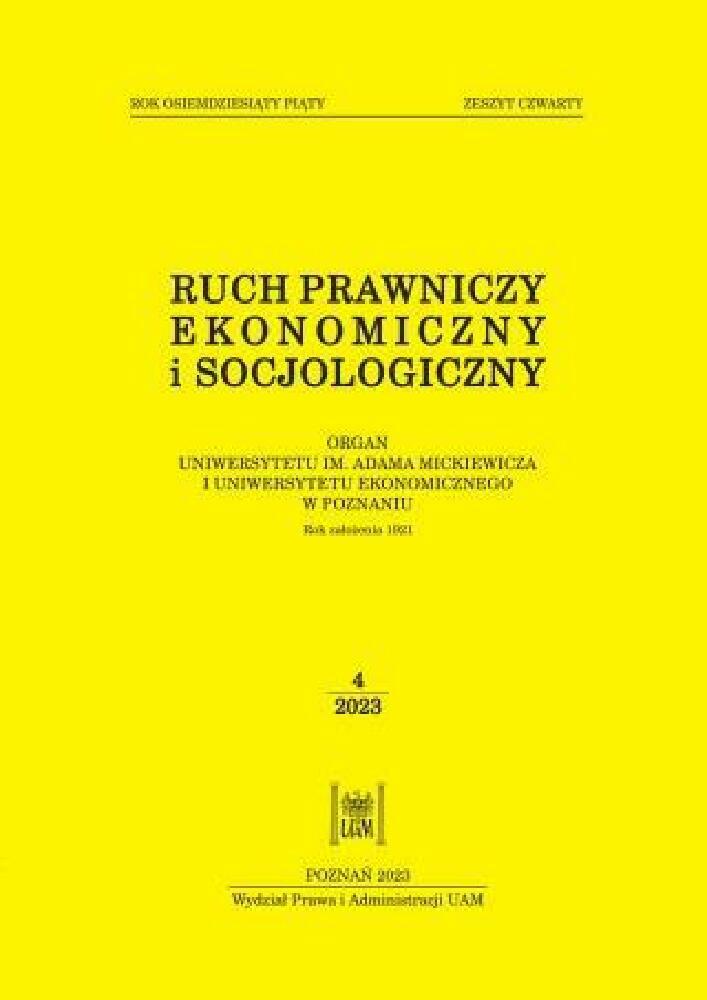Abstract
The impulse to take up the issue of legal education within the framework of formal education in Poland was the change in the core curriculum for secondary schools involving the introduction of a new subject ‘History and the present’ (historia i teraźniejszość, HiT) and a number of other changes. The article aims to answer the question of how the change indicated above affects the scope of legal education included in the core curriculum for secondary schools. The analysis of the core curriculum, carried out with the use of properly operationalized concepts of legal awareness and competence, showed that the impact of the analysed changes in the core curriculum for secondary schools on the scope of legal education in formal education in Poland is very large. First, the scope of knowledge of the law has been significantly reduced. Secondly, issues whose implementation fostered the development of certain skills – such as the formulation of judgements, the adoption of positions, or critical thinking that could lead to the formulation of demands for change – were practically eliminated.
References
Aspin, D.N., Chapman, J.D. (2012). Towards a philosophy of lifelong learning. W: D.N. Aspin, J.D. Chapman, K. Evans, R. Bagnall (eds.), Second International Handbook of Lifelong Learning (s. 3–35). Dordrecht, Heidelberg, London, New York: Springer. DOI: https://doi.org/10.1007/978-94-007-2360-3_1
Baroncelli, S., Fonti, F., Stevancevic G. (2014). Mapping innovative teaching methods and tools in European studies: results from a comprehensive study. W: S. Baroncelli, R. Farneti, I. Horga, S. Vanhoonacker (eds.), Teaching and Learning the European Union: Traditional and Innovative Methods (s. 89–110). Dordrecht: Springer. DOI: https://doi.org/10.1007/978-94-007-7043-0_7
Borucka-Arctowa, M. (1980). Świadomość prawna społeczeństwa polskiego. Ruch Prawniczy, Ekonomiczny i Socjologiczny 42(1): 153–165. http://hdl.handle.net/10593/20991
Brownhill, B. (2001). Lifelong learning. W: P. Jarvis (ed.), The Age of Learning. Education and the Knowledge Society (s. 69–79). London, New York: Routledge.
Choduń, A. (2020). Dlaczego warto uczyć o języku prawnym? Krytyka Prawa 12(2): 45–55. DOI: https://doi.org/10.7206/kp.2080-1084.380
Choduń, A., Gmerek, K. (2021). Knowledge about the language of legislative acts: an absent element in the development of key competences in the Polish education system. Krytyka Prawa 13(4): 217–237. DOI: https://doi.org/10.7206/kp.2080-1084.501
Corte, E. de (2012). Historical developments in the understanding of learning. W: H. Dumont, D. Istance, F. Benavides (eds.), The Nature of Learning: Using Research to Inspire Practice (s. 35–67). Paris: OECD.
Dinu, M. (2008). What is the knowledge society. Theoretical and Applied Economics 2(519): 45–50. https://www.ectap.ro/what-is-the-knowledge-society-marin-dinu/a288/
Dumont, H., Istance, D. (2010). Analysing and designing learning environments for the 21st century. W: H. Dumont, D. Istance, F. Benavides (eds.), The Nature of Learning: Using Research to Inspire Practice (s. 19–34). Paris: OECD. DOI: https://doi.org/10.1787/9789264086487-3-en
Dziewulak, D. (2020). Edukacja prawna w szkolnictwie podstawowym i średnim w Polsce, wybranych państwach Unii Europejskiej oraz w Serbii i Wielkiej Brytanii. Zeszyty Prawnicze Biura Analiz Sejmowych Kancelarii Sejmu 4: 220–241. DOI: https://doi.org/10.31268/ZPBAS.2020.87
Farhan, J.A., Jamiołkowska, M. (2020). Nauczanie prawa w szkołach średnich – analiza status quo i ocena rozwiązań systemowych. Krytyka Prawa 12(2): 56–78. DOI: https://doi.org/10.7206/kp.2080-1084.381
Glaesser, J. (2019). Competence in educational theory and practice: a criticaldiscussion. Oxford Review of Education 45(1): 70–85. DOI: https://doi.org/10.1080/03054985.2018.1493987
Halász, G., Michel, A. (2011). Key Competences in Europe: interpretation, policy formulation and implementation. European Journal of Education 46(3): 289–306. DOI: https://doi.org/10.1111/j.1465-3435.2011.01491.x
Hattie, J. (2012). Visible Learning for Teachers: Maximizing Impact on Learning. London, New York: Routledge. DOI: https://doi.org/10.4324/9780203181522
Jadach, K. (2015). Polityka prawa w polskich szkołach. Studia Edukacyjne 34: 19–44. DOI: https://doi.org/10.14746/se.2015.34.2
Longworth, N., Davies, K. (2013). Lifelong Learning: New Vision, New Implications, New Roles for People, Organizations, Nations and Communities in the 21st Century. London, New York: Kogan Page.
Marcela, M. (2021). Selekcje. Jak szkoła niszczy ludzi, społeczeństwo i świat. Kraków: Znak.
Nieborak, T. (2021). Czy edukacja prawna jest nadal potrzebna? Refleksje na 100-lecie „Ruchu Prawniczego, Ekonomicznego i Socjologicznego”. Ruch Prawniczy, Ekonomiczny i Socjologiczny 83(2): 267–278. DOI: https://doi.org/10.14746/rpeis.2021.83.2.17
Pękala, M., Zyzik, R. (2018). Społeczny obraz prawa. Opis obszaru badań i wyniki pilotażu. Zeszyty Prawnicze 18(4): 35–65. DOI: https://doi.org/10.21697/zp.2018.18.4.02
Przyborowska, B., Kopińska, V., Murawska, I. (2016). Kompetencje społeczne i obywatelskie w edukacji szkolnej – pozór w podstawie programowej dla trzeciego etapu edukacyjnego. Przegląd Badań Edukacyjnych 23(2): 45–60. DOI: https://doi.org/10.12775/PBE.2016.072
Skąpska, G. (2009). Komunikacja o prawie a świadomość i kultura prawna – krótki komentarz socjologa. W: K. Slany, Z. Seręga (red.), Sprostać zmianom. Szkice o powinnościach współczesnej socjologii (s. 245–255). Kraków: Nomos.
Solarczyk-Szwac, H., Kopińska, V., Matusiak, A. (2016). Kompetencje społeczne na wejściu w dorosłość. Krytyczna analiza podstawy programowej kształcenia ogólnego dla IV etapu edukacyjnego. Edukacja Dorosłych 75(2): 29–44. https://cejsh.icm.edu.pl/cejsh/element/bwmeta1.element.desklight-d3f7fe7f-8cb2-4325-81ce-1bbce739c461
Stadniczeńko, S.L., Zamelski, P. (2016). Pedagogika prawa. Vade mecum! Pójdź za mną! Warszawa: Wyższa Szkoła Finansów i Zarządzania.
Stehr, N. (2018). Modern societies as knowledge societies. W: M.T. Adolf (ed.), Nico Stehr: Pioneer in the Theory of the Society and Knowledge (s. 309–331). Mosbach: Springer. DOI: https://doi.org/10.1007/978-3-319-76995-0_20
Wilson, A. (2010). Knowledge Power: Interdisciplinary Education for a Complex World. Abingdon (Oxon): Routledge. DOI: https://doi.org/10.4324/9780203858035
Winczorek, J. (2019). Dostęp do prawa. Ujęcie socjologiczne. Warszawa: Wydawnictwo Naukowe Scholar.
Wiśniewska, E. (2021). Autonomia nauczyciela – wymiar teoretyczny i praktyczne implikacje. Społeczeństwo. Edukacja. Język 14(1): 40–59.
Woźniakowska-Fajst, D. (2012). Edukacja prawna – możliwości, szansy, bariery. Warszawa: INPRIS.
Zamelski, P. (2022). Propedeutyka filozofii prawa. Opole: Oficyna Wydawnicza Politechniki Opolskiej.
Zhang, Y.A., Cristol, D. (eds.) (2019). Handbook of Mobile Teaching and Learning. Singapur: Springer. DOI: https://doi.org/10.1007/978-981-13-2766-7
License
Copyright (c) 2023 WPiA UAM

This work is licensed under a Creative Commons Attribution 4.0 International License.





